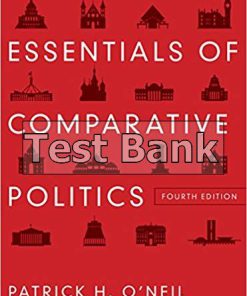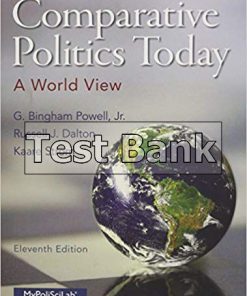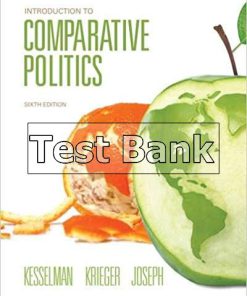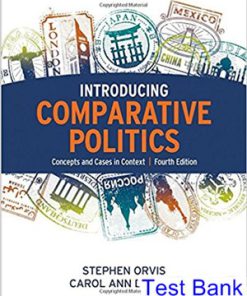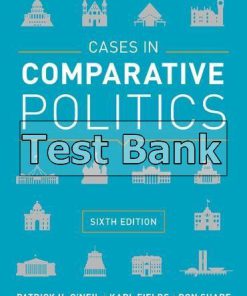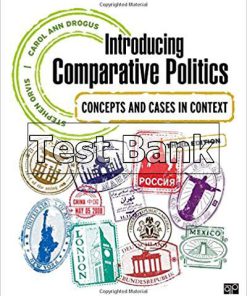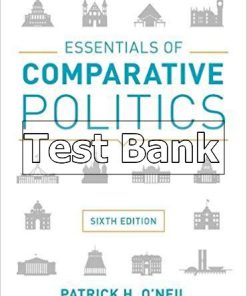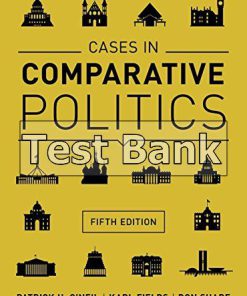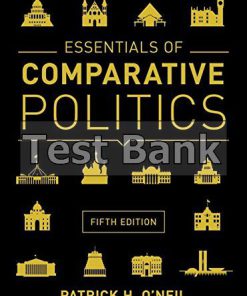Principles of Comparative Politics 3rd Edition Golder Test Bank
$50.00 Original price was: $50.00.$26.50Current price is: $26.50.
Principles of Comparative Politics 3rd Edition Golder Test Bank.
Principles of Comparative Politics 3rd Edition Golder Test Bank
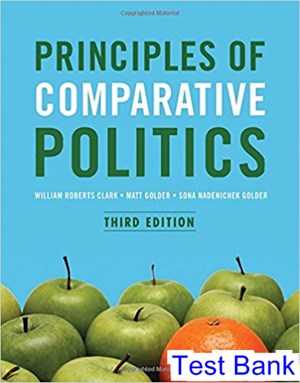
Product details:
- ISBN-10 : 1506318126
- ISBN-13 : 978-1506318127
- Author: William Roberts Clark
William Roberts Clark, Matt Golder, and Sona Nadenichek Golder’s groundbreaking Principles of Comparative Politics offers the most comprehensive and up-to-date introduction to comparative inquiry, research, and scholarship. In this thoroughly revised Third Edition, readers have an even better guide to cross-national comparison and why it matters. Readers are offered a new intuitive take on statistical analyses and a clearer explanation of how to interpret regression results; a thoroughly-revised chapter on culture and democracy that now includes a more extensive discussion of cultural modernization theory and a new overview of survey methods for addressing sensitive topics; and a revised chapter on dictatorships that incorporates a principal-agent framework for understanding authoritarian institutions.
Table contents:
- Part I. What is Comparative Politics?
- 1. Introduction
- Overview of the Book
- State Failure
- Economic Determinants of Democracy
- Cultural Determinants of Democracy
- What’s So Good about Democracy Anyway?
- Institutional Design
- The Approach Taken in This Book
- Key Concepts
- 2. What is Science?
- What is Science?
- The Scientific Method
- Step 1: Question
- Step 2: Theory or Model
- Step 3: Implications (Hypotheses)
- Step 4: Observe the World (Test Hypotheses)
- Step 5: Evaluation
- An Introduction to Logic
- Valid and Invalid Arguments
- Testing Theories
- Myths about Science
- Conclusion
- Key Concepts
- Problems
- 3. What is Politics?
- The Exit, Voice, and Loyalty Game
- Solving the Exit, Voice, and Loyalty Game
- Evaluating the Exit, Voice, and Loyalty Game
- Conclusion
- Key Concepts
- Preparation for the Problems
- Problems
- Part II. The Modern State: Democracy or Dictatorship?
- 4. The Origins of the Modern State
- What is a State?
- Somalia and Syria: Two Failed States
- Somalia
- Syria
- How Unusual Are Somalia and Syria?
- The Contractarian View of the State
- The State of Nature
- Solving the State of Nature Game
- Civil Society and the Social Contract
- The Predatory View of the State
- Conclusion
- Key Concepts
- Preparation for the Problems
- Problems
- 5. Democracy and Dictatorship: Conceptualization and Measurement
- Democracy and Dictatorship in Historical Perspective
- Classifying Democracies and Dictatorships
- Dahl’s View of Democracy and Dictatorship
- Three Measures of Democracy and Dictatorship
- Evaluating Measures of Democracy and Dictatorship
- Conclusion
- Key Concepts
- Problems
- 6. The Economic Determinants of Democracy and Dictatorship
- Classic Modernization Theory
- A Variant of Modernization Theory
- Economic Development and Democracy
- Natural Resources and Democracy
- Foreign Aid and Democracy
- Inequality and Democracy
- Economic Performance
- Some More Empirical Evidence
- Conclusion
- Key Concepts
- Appendix: An Intuitive Take on Statistical Analyses
- Problems
- 7. The Cultural Determinants of Democracy and Dictatorship
- Classical Cultural Arguments: Mill and Montesquieu
- Does Democracy Require a Civic Culture?
- Surveys and Comparative Research
- Religion and Democracy
- Are Some Religions Incompatible with Democracy?
- Some Empirical Evidence
- Are Some Religions Incompatible with Democracy? A New Test
- Experiments and Culture
- Conclusion
- Key Concepts
- Problems
- 8. Democratic Transitions
- Bottom-Up Transitions to Democracy
- East Germany 1989
- Collective Action Theory
- Tipping Models
- Top-Down Transitions to Democracy
- A Game-Theoretic Model of Top-Down Transitions
- Applying the Transition Game to Poland
- Conclusion
- Key Concepts
- Problems
- 9. Democracy or Dictatorship: Does It Make a Difference?
- The Effect of Regime Type on Economic Growth
- Property Rights
- Consumption versus Investment
- Autonomy from Special Interests
- Evidence
- The Effect of Regime Type on Government Performance
- Conclusion
- Key Concepts
- Problems
- Part III. Varieties of Democracy and Dictatorship
- 10. Varieties of Dictatorship
- A Common Typology of Authoritarian Regimes
- A Three-Way Classification: Monarchy, Military, Civilian
- Monarchic Dictatorships
- Military Dictatorships
- Civilian Dictatorships
- The Two Fundamental Problems of Authoritarian Rule
- The Problem of Authoritarian Power-Sharing
- The Problem of Authoritarian Control
- Selectorate Theory
- Institutions
- Mapping W and S onto a Typology of Regimes
- Government Performance
- Conclusion
- Key Concepts
- Problems
- 11. Problems with Group Decision Making
- Problems with Group Decision Making
- Majority Rule and Condorcet’s Paradox
- The Borda Count and the Reversal Paradox
- Majority Rule with an Agenda Setter
- Restrictions on Preferences: The Median Voter Theorem
- Arrow’s Theorem
- Arrow’s Fairness Conditions
- Conclusion
- Key Concepts
- Appendix: Stability in Two-Dimensional Majority-Rule Voting
- Problems
- 12. Parliamentary, Presidential, and Semi-Presidential Democracies
- Classifying Democracies
- Is the Government Responsible to the Elected Legislature?
- Is the Head of State Popularly Elected for a Fixed Term?
- An Overview
- Making and Breaking Governments in Parliamentary Democracies
- The Government
- Government Formation Process
- A Simple Model of Government Formation
- Different Types of Government
- Duration of Governments: Formation and Survival
- Making and Breaking Governments in Presidential Democracies
- Government Formation Process
- Types of Presidential Cabinets
- The Composition of Presidential Cabinets
- Making and Breaking Governments in Semi-Presidential Democracies
- A Unifying Framework: Principal-Agent and Delegation Problems
- Conclusion
- Key Concepts
- Problems
- 13. Elections and Electoral Systems
- Elections and Electoral Integrity
- Electoral Integrity: An Overview
- Electoral Integrity in Four Countries
- The Determinants of Electoral Integrity
- Electoral Systems
- Majoritarian Electoral Systems
- Proportional Electoral Systems
- Mixed Electoral Systems
- Legislative Electoral System Choice
- Conclusion
- Key Concepts
- Problems
- 14. Social Cleavages and Party Systems
- Political Parties: What Are They, and What Do They Do?
- Political Parties Structure the Political World
- Recruitment and Socialization of the Political Elite
- Mobilization of the Masses
- A Link between the Rulers and the Ruled
- Party Systems
- Where Do Parties Come From?
- Types of Parties: Social Cleavages and Political Identity Formation
- Origins of the British Party System
- Social Cleavages
- Theorizing about Politicized Cleavages
- Number of Parties: Duverger’s Theory
- Social Cleavages
- Electoral Institutions
- The Mechanical Effect of Electoral Laws
- The Strategic Effect of Electoral Laws
- Summarizing Duverger’s Theory
- Conclusion
- Key Concepts
- Problems
- 15. Institutional Veto Players
- Federalism
- Federalism: Federalism in Structure
- Decentralization: Federalism in Practice
- Why Federalism?
- Bicameralism
- Types of Bicameralism
- Why Bicameralism?
- Constitutionalism
- The Shift to a New Constitutionalism
- Different Systems of Constitutional Justice
- Veto Players
- Conclusion
- Key Concepts
- Problems
- Part IV. Varieties of Democracy and Political Outcomes
- 16. Consequences of Democratic Institutions
- Majoritarian or Consensus Democracy?
- Two Visions of Democracy
- Majoritarian and Consensus Institutions
- Political Representation
- The Effect of Political Institutions on Fiscal Policy
- Economic and Cultural Determinants of Fiscal Policy
- Electoral Laws and Fiscal Policy
- Summary
- Electoral Laws, Federalism, and Ethnic Conflict
- Ethnic Diversity and Conflict
- Electoral Laws and Ethnic Conflict
- Federalism and Ethnic Conflict
- Presidentialism and Democratic Survival
- The Perils of Presidentialism
- The Difficult Combination: Presidentialism and Multipartism
- Summary
- Conclusion
- Key Concepts
- Problems
- References
- Index
People also search:
principles of comparative politics 3rd edition pdf
|
principles of comparative politics 3rd edition free
principles of comparative politics 3rd edition answer key
principles of comparative politics 3rd edition pdf free
principles of comparative politics 3rd edition ebook
principle of comparative politics
|
Instant download after Payment is complete
You may also like…
Solutions Manual
Test Bank
Introducing Comparative Politics Concepts and Cases in Context 3rd Edition Orvis Test Bank
Solutions Manual
Solutions Manual
Essentials of Comparative Politics 5th Edition ONeil Test Bank




